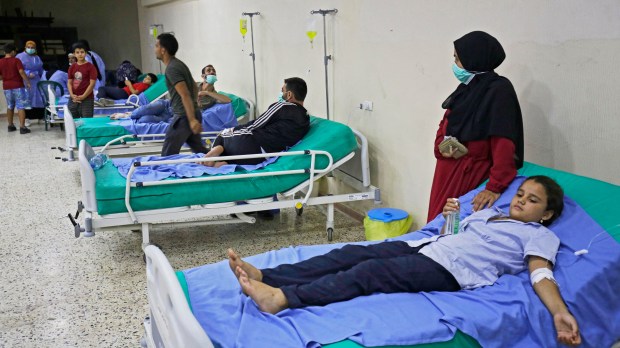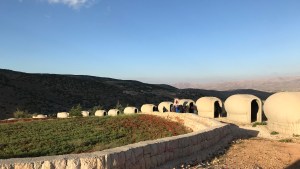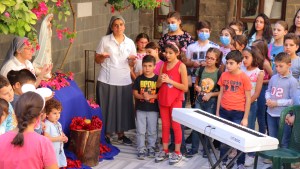In spite of the extreme hardships Lebanon is going through right now – and there are many, causing widespread suffering – there is hope that people will pull through. And one thing that seems to keep hope alive is the family culture among the Lebanese people.
Though the government is currently deadlocked and seems to be unable to find solutions to Lebanon’s economic crisis, people have never looked to the government for help anyway.
“Within Lebanese society, there’s never been a dependence on the government for support, as a social safety net,” said Cedric Choukeir, Catholic Relief Services country representative in Lebanon. “People’s social safety net are their families and their relatives, both in the country and abroad. That’s how society is; that’s how people take care of the elderly.”
Choukeir reflected on Lebanon’s ongoing struggles in the wake of Pope Francis’ recent call for Lebanon’s political leaders to put their own interests aside and work for the common good.
“I take this opportunity to appeal to Lebanese politicians to put your personal interests aside and speak about the country and come to an agreement,” Francis said during an in-flight press conference on his way back to Rome after visiting Bahrain in early November. “First God, then country, then personal interests.”
Another religious leader, Maronite Patriarch Bechara Boutros Raï, during a November 11 meeting of Catholic Patriarchs and Bishops of Lebanon, called for an international conference to help Lebanon break its political deadlock.
Magnitude of suffering
Many Lebanese hope for the same thing, especially since an International Monetary Fund aid package of $3 billion depends on concrete reforms in government.
In the meantime, the suffering manifests in a variety of ways throughout Lebanese society. The Lebanese Pound has lost 90% of its value. Lebanese are unable to access their savings, with bank accounts frozen. Public servants, receiving insufficient pay, are not working, or severely cutting their hours. Sixty percent to 70% of Lebanese are living below the poverty line. People normally have to suffice with only two to four hours of electricity a day, and utility bills have become unaffordable. Medicine is hard to come by.
Caritas Lebanon director of programs Nayla El-Khoury reports that there is a worrying rise in cholera infections, as many wastewater treatment plants have ceased functioning. (In photo above, cholera patients are treated in a mosque hall converted into a field hospital in the town of Bebnine in north Lebanon on October 26). She also said there is a sharp rise in food insecurity, as Lebanon has in the past relied mostly on imports for its food. Certainly, the war in Ukraine has not helped in that area, and the dearth of fertilizers has impacted farmers in Lebanon.
“Access to education is another problem,” El-Khoury said. Parents who are now unable to pay tuition for private schools are moving their children into public schools, placing additional burdens on those institutions. “They are already overstretched,” she said. “Already, they lack the capacity to accommodate additional children.”
“Most people are not making enough money to feed, clothe, and house their families,” said Edward F. Clancy, director of outreach for Aid to the Church in Need US, which supports several aid projects in Lebanon.
A lot of Lebanese are relying on money from family members abroad, Chokeir said.
Roots of the problem
The roots of Lebanon’s problems are multifaceted, and solutions are not easy to implement, let alone figure out. Choukeir traces today’s troubles, in part, to the years after Lebanon’s civil war, which lasted from 1975-1990. In its recovery and reconstruction, Lebanon came to be considered a safe haven for overseas investment — and there is a large and fairly well-off Lebanese diaspora.
“What the Lebanese did, with the support of the central bank, was to take out significant loans for reconstruction of the country, at high interest rates,” Choukeir said. Lebanon has a big diaspora and a strong banking sector. “So, effectively, the government was borrowing through the central bank, primarily from Lebanese private banks. Lebanese private banks had a significant amount of deposits from the Lebanese diaspora, who put their money there because the banks were offering very high interest rates – going over 10%.”
But because of corruption, the loans the government took out didn’t go into areas that are financially sustainable, he said. “So effectively the banks were covering the government deficit for recurring costs, year after year after year. And the bulk of the costs are linked to the electricity sector, which the government was subsidizing. The system kept working because it’s kind of a Ponzi scheme. As long as people are putting more funds into Lebanese banks, those new funds would cover what the government needed to keep functioning, and would cover the interest rates. But we got to a point where the Lebanese budget, around 60% of the public spending went to pay off interest on loans. … That only leaves 40% of the public spending going to the actual country. Out of that 40% almost half of it was going to keep fuel for the electricity running in the country. And then the rest would go to public servants.”
In 2018, remittance money coming from Lebanese expats started drying up. “There wasn’t enough money coming in to keep this system functioning,” Choukeir said. “That’s what kind of triggered things in 2019, because then, the private banks had to start using up their deposits to cover the deficit in the government from 2018 to 2019.”
Devaluation of the currency and the freezing of bank accounts began in 2019. Then the COVID-19 pandemic hit, with lockdowns starting around March 2020. Many people lost their jobs because of that. Then in August 2020 an explosion in the port of Beirut, caused by massive amounts of ammonium nitrate that had been negligently stored, killed at least 218 people, caused $15 billion worth of damage, and left some 300,000 people homeless.
“The majority of the population doesn’t see any kind of hope on the horizon because the way that the government and different political leaders have dealt with the crisis has not been helpful, meaning that we’ve had political deadlocks in terms of forming governments because of bickering over seats and how much each party gets that we’ve been without a functional government for the most part of the past three years,” Choukeir said.
With almost 30 political parties in Lebanese society, no one can amass a majority, and no one can do anything without building coalitions, he explained.
“Since the parliamentary elections [in April 2021], we don’t have a cabinet, a government. The current government is a caretaker government,” he said. “They’re not supposed to meet to do anything; they’re just supposed to wrap up what they’re doing until a new government is formed.”
“And then the president’s term ended in October, so we don’t have a president,” Choukeir continued. “In a normal situation, the Council of Ministers takes over the powers of the president, but right now the Council of Ministers is a caretaker one. … Electing a new president requires a two-thirds majority in Parliament. And no coalition has that or is able to get that number of votes, because Parliament is kind of equally divided between the kind of pro-US parties and the pro-Iran parties.”
Christian presence
Can a solution be found? That’s anyone’s guess, but it’s vital that it is — not only to help relieve the suffering of ordinary people, but to help maintain a Christian presence in a country that has prided itself on societal coexistence and tolerance.
“I think in Lebanon you have an almost even split between Sunni and Shia, which creates a lot of tension within the Muslim communities,” said Aid to the Church in Need’s Clancy, “and so often Christians are the intermediaries, the go-betweens, the communicators that help in those situations. So they have a great value to Lebanese society. Many popes, including John Paul II, mentioned how important Lebanon was to Christianity in the Middle East. We believe it’s a worthwhile effort to keep them there and sustain the community.”
Pope Francis, echoing his predecessors, has more than once recalled that Lebanon is more than a country, it’s a message. He’s said:
Dear Lebanese friends, I greatly desire to visit you and I do not tire of praying for you, so that Lebanon will once more be a message of peace and fraternity for the entire Middle East.



